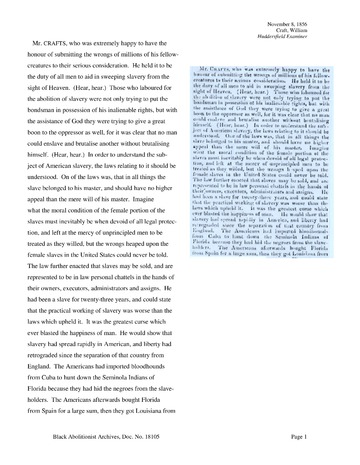(page1).jpg.jpg)
Title: Frederick Douglass' Paper - April 28, 1854
Speaker or author: Watkins, William J.
Newspaper or publication: Frederick Douglass' Paper (1851 - 18??)
The writer suggests that Stephen A. Douglas in his fight for the passage of the Nebraska Bill is actually helping the fight against slavery by bringing the issue to the public eye. There is now a very pronounced distinction between "the north" and "the south" as the country divides on the issue of slavery in the new territories.
Description of file(s): one scanned, two columned, newspaper page
(page1).jpg.jpg)
Title: Frederick Douglass' Paper - August 25, 1854
Speaker or author: Watkins, William J.
Newspaper or publication: Frederick Douglass' Paper (1851 - 18??)
The writer describes some his experiences in several cities he visited during his speaking tour of New York and Connecticut.
Description of file(s): two scanned, two columned, newspaper pages
(page1).jpg.jpg)
Title: Frederick Douglass' Paper - December 1, 1854
Speaker or author: Watkins, William J.
Newspaper or publication: Frederick Douglass' Paper (1851 - 18??)
The writer gives brief comments on the results of the current election in a few states. He offers an overview of the way the election is proceeding at that point.
Description of file(s): one scanned newspaper column
(page1).jpg.jpg)
Title: Frederick Douglass' Paper - December 15, 1854
Speaker or author: Watkins, William J.
Newspaper or publication: Frederick Douglass' Paper (1851 - 18??)
The writer comments on the possibility of slavery in Kansas.
Description of file(s): one scanned newspaper column
(page1).jpg.jpg)
Title: Frederick Douglass' Paper - December 8, 1854
Speaker or author: Watkins, William J.
Newspaper or publication: Frederick Douglass' Paper (1851 - 18??)
The writer comments that the "voice of the People" was ignored when the Kansas-Nebraska Act was passed. He believes that "renegade" politicians intent on reinforcing a "slave powered" economy are going to do what they want regardless of how their actions affect the people involved.
Description of file(s): one scanned newspaper column
(page1).jpg.jpg)
Title: Frederick Douglass' Paper - December 8, 1854
Speaker or author: Watkins, William J.
Newspaper or publication: Frederick Douglass' Paper (1851 - 18??)
The writer continues his answer to the question "What have the Abolitionists done?" that he began in a previous issue. He explains that abolitionists have kept the focus on the issue of slavery by agitation, speeches, aid to fugitives, and an untiring devotion to the cause of freedom. The have suffered imprisonment, shame, and personal attacks for what they believe is right.
Description of file(s): three scanned newspaper pages (five columns)
(page1).jpg.jpg)
Title: Frederick Douglass' Paper - June 2, 1854
Speaker or author: Watkins, William J.
Newspaper or publication: Frederick Douglass' Paper (1851 - 18??)
The writer tells his readers that the Nebraska Act has stirred up political focus on the question of continued slavery and is succeeding in dividing the country politically in this regard.
Description of file(s): one scanned newspaper column
(page1).jpg.jpg)
Title: Frederick Douglass' Paper - June 23, 1854
Speaker or author: Watkins, William J.
Newspaper or publication: Frederick Douglass' Paper (1851 - 18??)
The writer jokes that the initials of those who signed the Nebraska Bill spell out the word "dogs." He adds that letters can be arragned to spell out the words "dogs" and "sold" can be found in Stephen A. Douglas' name as well.
Description of file(s): one scanned newspaper column
(page1).jpg.jpg)
Title: Frederick Douglass' Paper - June 23, 1854
Speaker or author: Watkins, William J.
Newspaper or publication: Frederick Douglass' Paper (1851 - 18??)
The writer briefly expresses his anger over the recent Congressional decision on the Nebraska Bill.
Description of file(s): one scanned newspaper column
(page1).jpg.jpg)
Title: Provincial Freeman - April 21, 1855
Speaker or author: S.
Newspaper or publication: Provincial Freeman (1853 - 1859)
The writer comments on a letter regarding Canadian immigration of fugitive slaves written by Mr. Gaines, U.S. politician. He emphasizes the discrepancies in Mr. Gaines' thinking and political rhetoric.
Description of file(s): three scanned newspaper pages (five columns)
(page1).jpg.jpg)
Speaker or author: S.
Newspaper or publication: Provincial Freeman (1853 - 1859)
The writer discusses various political views on immigration, prejudice, and abolitionism currently held in the U.S. He informs his readers that some people who claim to be abolitionists and Emigrationists are actually motivated by a prejudice against those of African descent.
Description of file(s): two scanned, two columned, newspaper pages
(page1).jpg.jpg)
Title: Provincial Freeman - July 26, 1856
Speaker or author: S[hadd], I[saac] D.
Newspaper or publication: Provincial Freeman (1853 - 1859)
The writer discusses the effect of the Fugitive Slave Law on the increased number of people arriving in Canada in hopes of finding the freedom they were being denied in the U.S.
Description of file(s): one scanned, two columned, newspaper page
(page1).jpg.jpg)
Title: Provincial Freeman - June 10, 1854
Speaker or author: Ward, Samuel Ringgold, b. 1817
Newspaper or publication: Provincial Freeman (1853 - 1859)
In a letter to the editor, the writer describes two types of aboltionists: both want freedom for the slave, but one type wants this freedom limited and restricted. There are more of this type than of those working for true human equality. His view of freedom includes human equality and civil rights, and it's this view that he encourages among those who claim to be abolitionists.
Description of file(s): two scanned, two columned, newspaper pages
(page1).jpg.jpg)
Title: Provincial Freeman - June 3, 1854
Speaker or author: editor
Newspaper or publication: Provincial Freeman (1853 - 1859)
The writer questions the motivation of free African Americans to remain in the U.S. when the atmosphere of prejudice and the fight for emancipation seems so overwhelming.
Description of file(s): one scanned newspaper column

Speaker or author: Craft, William
Newspaper or publication: Huddersfield Examiner
Speech given before an English audience detailing the injustices of the system of slavery in the U.S. The speaker stressed the lack of legal representation or recourse available to slaves, emphasizing that the government was not interested in their welfare.
Description of file(s): PDF 6 page, 2,031 word document (text and images)



